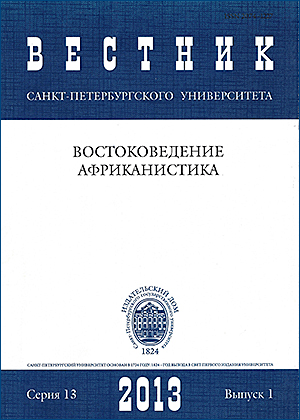Numerals with quantitative meaning in Japanese idioms
Abstract
The article focuses on the category of quantity in the Japanese language on the base of idioms. In particularly, it analyzes numerals and words with morphemes with quantitative meaning in Japanese idioms. The author describes connotations in the meaning of numerals written with the help of hieroglyphs and factors which cause these connotations (namely, adoption of Chinese philosophical doctrines and Buddhism, influence of American culture and English language in American variant and etc.). In addition, it describes how these connotative meanings are revealed in Japanese idioms. Moreover the brief overview of Japanese and Russian literature concerning the study of Japanese idioms is given in the article. The results show that connotations in the meaning of numerals are connected only with hieroglyphs and are not presented in numerals and words written with Arabic figures or Japanese alphabet (katakana). The meaning of numerals and lexica with quantitative meaning may be deviated from the basic meaning in the idioms. Words and idioms with quantitative meaning are on the periphery of the category of quantity but in the hieroglyphic culture (Japanese culture) visual pictures are more expressive than words. This thesis is confirmed by considerable number of words and idioms with quantitative meaning in the Japanese language.
Keywords:
numerals, idioms, quantity, the Japanese language
Downloads
References
References
Downloads
Published
How to Cite
Issue
Section
License
Articles of "Vestnik of Saint Petersburg University. Asian and African Studies" are open access distributed under the terms of the License Agreement with Saint Petersburg State University, which permits to the authors unrestricted distribution and self-archiving free of charge.





